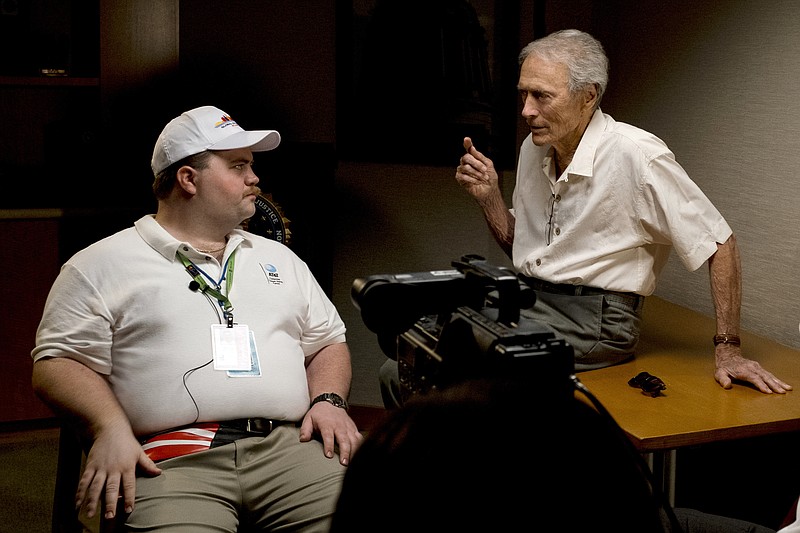When Hollywood makes movies that echo the viewpoint of those who populate, glorify in and promote the largely left-wing cinematic bubble, all is right with the world.
When a film offers a different viewpoint, the knives come out.
Such is the case with "Richard Jewell," the current Clint Eastwood-directed film that tells the story of a security guard at the 1996 Atlanta Olympics who is first hailed as a hero for moving people in Centennial Park away from what he believed could be a bomb but then became the prime suspect in that bombing.
Reviews of the movie have described it as "a MAGA screed calibrated to court favor with the red hat-wearing faithful by vilifying the president's two favorite enemies: the FBI and the media" (Daily Beast) and "an assertion of a worldview - a Reaganite one in which the most dangerous threats to well-meaning, ordinary-ish white guys like Jewell are big government and an unscrupulous media" (Slate).
"Richard Jewell," it should be noted, was based on an event that occurred smack in the middle of a Democratic presidential administration, post-dating the Reagan era by eight years and preceding the Trump/Make America Great Again term by more than 20 years.
Attempting to glom two media-hated but selectively popular Republican presidents onto criticism of the film seems desperate at worst and weak at best.
But, truth be told, it was released at a time when the reputation of the media is poor and the character of the FBI is reeling from the upbraiding it received in the recent Justice Department's inspector general report on the early stages of the FBI's investigation into Russian meddling in the 2016 presidential election.
Yet film release dates are set months in advance. That the opening of the film happened to occur within a couple of weeks of the inspector general's report was mere coincidence.
Still others see Eastwood's portrayal of Kathy Scruggs as a profane, amoral reporter for the Atlanta Journal-Constitution who will trade sex with sources for a scoop - and whose paper first outed Jewell as a suspect - as misogynistic.
The real-life reporter isn't around to defend herself. She died in 2001 at the age of 42 from what was said to be an overdose of prescription drugs for chronic back pain.
Stopping short of a complete denial of Scruggs' willingness to have sex with an FBI agent for a scoop, Journal-Constitution editor in chief Kevin Reilly said "there is no evidence that this ever happened" and said the suggestion of it is "offensive and deeply troubling in the #MeToo era."
The movie's officials have stood by their portrayal, maintaining it was based on a variety of reliable sources. Ultimately, Jewell was cleared, and Eric Robert Rudolph admitted to the bombing in 2005.
We likely will never know what Scruggs did or didn't do, but we do know when the unsympathetic real person portrayed on the screen is a conservative or a Republican, the same pundits who suggest "Richard Jewell" as a political statement made to plump Trump are the first ones to assert their First Amendment liberties to say what they want to say.
The movies "Nixon," "W" and "Vice" come to mind, among many.
"Nixon" (1995) portrays the 37th president as an unhinged leader who drank heavily and uncontrollably and whose drinking problem may have clouded his decision making. However, historians have said while the president may have been somewhat paranoid and depressed as the Watergate scandal closed around him, he always was rational in his decision-making and respectful for other people's views.
"W" (2008), released in the last year of the presidency of George W. Bush, is said to at a minimum "take liberties with the character," according to one review, suggesting (based on the word of Hustler publisher Larry Flynt) that Bush once arranged for a woman he allegedly impregnated to have an abortion and portraying an argument between Bush and his father, President George H.W. Bush, as occurring in the Oval Office when a similar tiff actually occurred nearly two decades earlier.
"Vice" (2018), nominated for an Academy Award for Best Picture, includes scenes not even remotely based on truth, including a passionate exchange in Shakespearean verse about the path to power between former Vice President Dick Cheney, the movie's subject, and his wife, Lynne, and a mid-1970s exchange between Cheney and future Supreme Court Justice Antonin Scalia about a constitutional theory that wouldn't be conceived until years later.
Are Nixon, George W. Bush and Cheney fair game because they're public figures and Scruggs is not? If a director shouldn't stretch the truth about Scruggs, should they about GOP office-holders?
For more than a century, Americans have been going to the movies. We used to routinely suspend reality when we walked through the doors because we were about to see somebody's version of a story. Now we can't even suspend our worldview.
